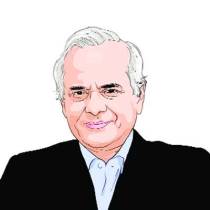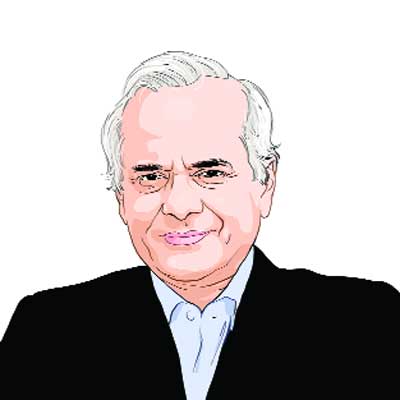Juggler’s art
Petroleum minister has to achieve oil supply security and balance the country’s strategic interests

The petroleum minister has to buffer the voting public from the pressures of high retail prices of petrol and diesel and hold fast to the principles of market-determined pricing and deregulation. (Reuters photo)
It has never been easy to call the oil market. The economic drivers of demand, supply and inventories have often been scrambled by the intangibles of Wall Street speculators and geopolitics. This mix is today compounded by another intangible. The “emotional” predilections of the leaders of the petro-states. Our minister of petroleum will need to display a juggler’s dexterity to achieve supply security without abridging sovereign rights and/or compromising principles.
Emotion has been a factor in determining oil prices on notably two previous occasions. The first was in 1973. The OPEC ratcheted up prices four fold in anger at the Western World’s support for Israel in the Yom Kippur Arab-Israel conflict. The second was in 2003. President George W Bush decided to “shock and awe” Saddam Hussein into submission less because of evidence the Iraqi leader was amassing weapons of mass destruction or was close to acquiring such weapons than because of his visceral hatred of the man. (It was rumoured that Hussein had had the tiling on the floor of the lobby of a five-star hotel in Baghdad shaped to resemble the US president. Visitors had to walk over his “ face “ to get to the reception).
Today, this factor has once again become a preponderant influence. America is one of the the largest producers of petroleum in the world. Earlier this year, President Donald Trump pulled America out of the JCPOA , the multi-nation nuclear deal that had been signed in 2014 to contain Iran’s nuclear programme. Simultaneously, he issued notices that all countries and companies must stop doing business with Iran within six months and that if they did not comply, he would sanction them under the US law, CAATSA (Countering American Adversaries through Sanctions Act). This decision was not based on facts, logic or public interest. It was driven by Trump’s subjective beliefs and perceptions, albeit overlaid by political opportunism. But the consequence was to suck the oil market into a vortex of uncertainty. The impact on prices of Trump’s decision is still not clear. It will depend on how much of Iran’s daily exports of approximately 1.5 million barrels are pulled from the market. If a sizeable percentage is taken out, the price of oil may spike sharply. This is because there is limited short-term spare capacity and US shale producers face pipeline constraints
In similar vein, Mohammed Bin Salman (MBS), the Crown Prince of Saudi Arabia has thrown a monkey wrench into the market. Legally and officially, it is a matter of conjecture as to who ordered the grisly murder of Jamal Khashoggi, the Saudi journalist, in the Saudi consulate in Istanbul. It is also a matter of conjecture as to whether the king will circumscribe MBS’s plenipotentiary powers. What is not, however, in doubt is that the oil market was almost pushed off the edge by the “emotional” initial response of the Saudis to the global condemnation of MBS that followed the journalist’s disappearance. First, a Saudi official issued the not-so-subtle forewarning that “the kingdom had an influential and vital role in the global economy” and then the ARABIYA news network pronounced that Saudi Arabia would use the oil weapon if the Kingdom were sanctioned by the US. Fortunately, the “threat” was doused by the Saudi minister of petroleum. But there was a brief period when it looked as if oil prices would reach triple digits.
The point of the above two examples is to highlight the trend towards and the impact of “personalised” oil policy. The trend is broad-based. The levers of oil policy in most petro states are in the hands of “autocratic” leaders — individuals with a strong sense of self, who believe they have all the answers, who demand loyalty and brook no opposition. Thus, Vladimir Putin in Russia, Nicolas Maduro in Venezuela, Ayatollah Khamenei in Iran and, as of last week, Trump’s ideological clone, Jair Bolsonaro in Brazil.
“Personalisation” would not have been an issue in the past when oil was traded mostly against long-term supply contracts. Today, however, in an integrated, liquid and fungible market characterised by flexible, short-term deals, it is of relevance. The local actions of individual leaders have global ramifications on prices.
In this market context, the petroleum minister has unenviable job. He has to keep several balls in the air. He has to buffer the voting public from the pressures of high retail prices of petrol and diesel and hold fast to the principles of market-determined pricing and deregulation. He has to ensure reliable and secure supplies of crude and safeguard his ethics and values. He has to defend India’s sovereign right to choose unfettered the suppliers of petroleum and protect its non-oil “strategic” interests.
So far, the minister has shown a juggler’s dexterity. He has not allowed any of the balls to hit the ground. The retail prices of petrol and diesel have ratcheted up but the people are not out on the streets. Saudi Arabia has reaffirmed its umbilical ties with India by committing to invest along with Abu Dhabi in the construction of the world’s largest refinery in Ratnagiri. And there are signals that Trump will exempt India from CATSAA on the grounds that India has reduced its imports from Iran and it will pay Iran in rupees and/or kind, but not in the hard currency that Trump alleges is diverted to support the Hezbollah in Lebanon, the Houthis in Yemen and President Assad in Syria .
Looking ahead, however, the minister may need more hands. For there is no knowing what curved ball will get thrown at him by one of his international colleagues. In my view, rather than worry about this eventuality or consider improving his skills as a juggler, the minister should focus on long-term fundamentals. Demand management, accelerated development of electric vehicles and increased investment in clean energy R&D. Such measures would most effectively counter the impact of “personalised” and “emotional” oil policy.
The writer is chairman and senior fellow, Brookings India
For all the latest Opinion News, download Indian Express App
More From Vikram S Mehta
- Three men & a possibilityKuldip Nayar and Vajpayee rejected narrative of Partition for India-Pak. Imran Khan can rewrite the script ..
- Trump’s foreign policy: An unlovely triangleBetween strategic-energy interests with Iran and a flip-flopping US president, India must find its own balance. ..
- Over The Barrel: Networked and vulnerableA tightly-connected world is more imperilled by cyber attack, disease and global warming. It requires inspired leadership. India and China have an opportunity. ..








































No hay comentarios:
Publicar un comentario